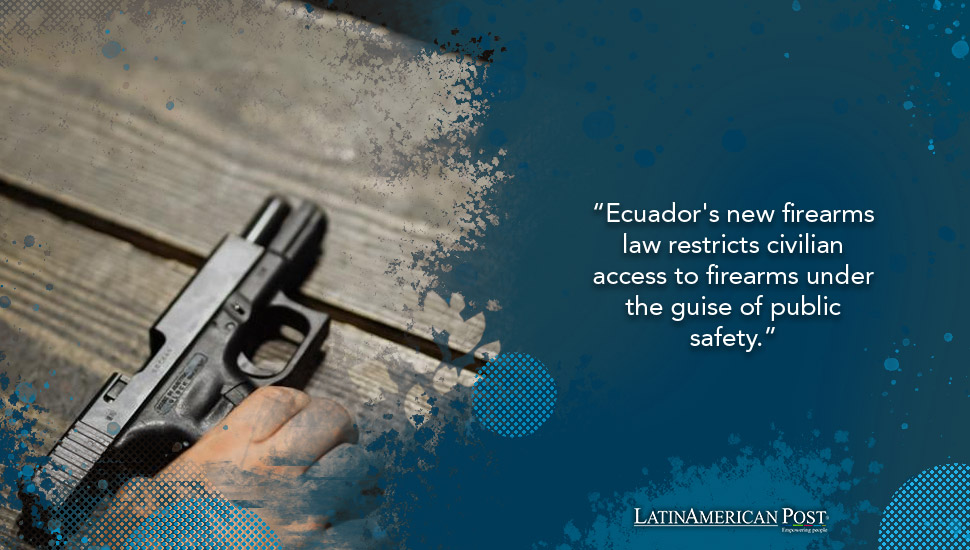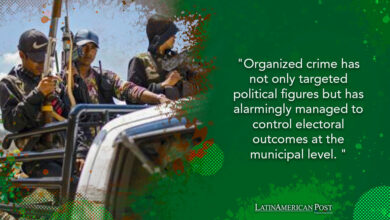Ecuador’s Restricting Firearms Rights Endangers Honest Citizens, Empowers Criminals

Ecuador’s new firearms law restricts civilian access to firearms under the guise of public safety. However, this decision undermines the right to self-defense for law-abiding citizens while emboldening criminals who continue to access illegal weapons.
The Dangerous Misstep of Restricting Self-Defense Rights
The Ecuadorian National Assembly’s recent approval of a new firearms law, which imposes strict requirements on civilian gun ownership, represents a significant and dangerous misstep. While the law was designed to curb rising violence and criminality, it achieves the opposite—placing law-abiding citizens in greater danger while criminals continue to operate with impunity.
The legislation, which includes stringent conditions such as a minimum age of 25, psychological evaluations, and Ministry of Health-backed certifications, may appear well-intentioned. However, this is an illusion of safety. For honest citizens who want to protect themselves and their families, these restrictions make it nearly impossible to own a firearm legally. Meanwhile, Ecuador’s streets are still flooded with illegal weapons as criminals find new ways to bypass the law. Rather than addressing the root causes of crime, this law punishes those seeking lawful means of self-defense.
By restricting access to firearms for civilians, the government is stripping away the most basic right to personal protection. In a country where criminal violence continues to soar, leaving citizens defenseless against armed criminals is both irresponsible and dangerous. This decision fails to safeguard the public and sends a clear message to criminals: they can continue their activities without fear of armed resistance from ordinary people.
Criminals Thrive as Citizens Are Left Vulnerable
The statistics are chilling: Ecuador has become the country with the highest homicide rate in Latin America, with 47.2 murders per 100,000 people in 2023. Most of these murders were carried out with firearms, often illegal ones that will remain untouched by this new law. Criminal organizations, particularly those linked to drug trafficking and illegal mining, have no difficulty obtaining weapons despite existing controls.
So why restrict civilians, who are already facing a daunting rise in crime? The answer from lawmakers is clear: they believe that strict controls on gun ownership will lower crime rates. But history and global examples have shown time and again that when you disarm law-abiding citizens, you don’t reduce crime—you increase it. Criminals don’t follow gun laws. Instead, they see new restrictions as an advantage, knowing their potential victims are increasingly defenseless.
The ease with which criminals can access firearms. At the same time, ordinary citizens are prevented from doing so, shifting the balance of power dramatically in favor of those who wish to harm. It emboldens criminal elements, knowing they can operate without fear of armed resistance. Citizens, on the other hand, are left vulnerable to kidnappings, extortion, and home invasions. The chilling effect is immediate: people live in fear, and communities that once stood a chance against crime now cower in silence.
The real issue isn’t responsible citizens owning guns—it’s the unchecked rise of illegal firearms in the hands of criminals. By restricting access to weapons for everyday citizens, the government effectively gives criminals the upper hand, leaving law-abiding people at a severe disadvantage in the fight for their safety.
Addressing Crime Requires Empowering Citizens, Not Limiting Them
Law enforcement alone cannot solve Ecuador’s crime wave. Even the military’s intervention in prisons, part of the state’s emergency measures, has done little to curb organized crime’s influence. Criminal networks have shown resilience and adaptability, continuing to terrorize communities despite government efforts. What is often overlooked, however, is the role of empowered citizens in supporting these efforts through responsible self-defense.
Rather than disarm civilians, Ecuador’s government should focus on better enabling them to defend themselves. Criminals are less likely to attack a population that is armed and prepared to fight back. The threat of retaliation is a powerful deterrent that could complement the work of the police and military.
Programs to train and educate citizens on responsible gun ownership and the legal use of firearms should be at the forefront of any crime prevention strategy. These initiatives can instill a culture of respect and responsibility around gun ownership while simultaneously ensuring that those who wish to protect themselves can do so legally and safely.
It is essential to acknowledge that firearm ownership comes with immense responsibility. However, those who meet the necessary criteria should not deny this responsibility. Instead of imposing unnecessary hurdles on law-abiding citizens, Ecuador should focus on strict enforcement of laws against illegal arms trading and criminal possession of firearms. By tackling the illicit trade of weapons and empowering citizens, the country can balance public safety and the right to self-defense.
Responsible Gun Ownership and Public Safety
While public safety must remain a top priority, disarming honest citizens is not the solution. Creating a legal framework that encourages responsible gun ownership without compromising security is possible. By maintaining strict penalties for gun-related crimes and ensuring that only qualified individuals can own firearms, Ecuador can foster a safer environment without leaving its population defenseless.
The solution lies not in blanket restrictions but in targeted reforms. The government must ensure that civilians who meet all necessary qualifications, including mental health screenings and proper training, can own firearms for personal protection. This would deter criminals who thrive on the knowledge that their victims are often powerless to defend themselves.
Furthermore, policymakers must recognize that the most effective way to reduce crime is to empower citizens and law enforcement. This includes investing in police forces, ensuring that they are well-equipped and trained, and promoting community-based policing initiatives that encourage collaboration between law enforcement and residents.
Ecuador’s rising crime rates are a direct result of emboldened criminals who know that the state struggles to maintain control. By stripping civilians of their right to defend themselves, the government is playing right into the hands of these criminals. It is imperative that Ecuador reverses this course and focuses on empowering its citizens, supporting responsible firearm ownership, and cracking down on the illegal weapons trade. Only then can it create a safer, more just society for all.
The new firearms legislation in Ecuador, while intended to combat rising violence, will have the opposite effect. Restricting access to firearms for law-abiding citizens undercuts their ability to protect themselves while empowering criminals who have no intention of following the law.
Also read: Ecuador’s Judicial Corruption: The Irony of Justice Turned Criminal
The government’s role should not be to disarm its people but to ensure that those who choose to arm themselves do so responsibly and with the necessary oversight. This balance between public safety and individual rights is essential in the fight against crime. By focusing on enforcing existing laws against illegal firearms and empowering citizens through responsible gun ownership, Ecuador can create a safer, more secure future.





